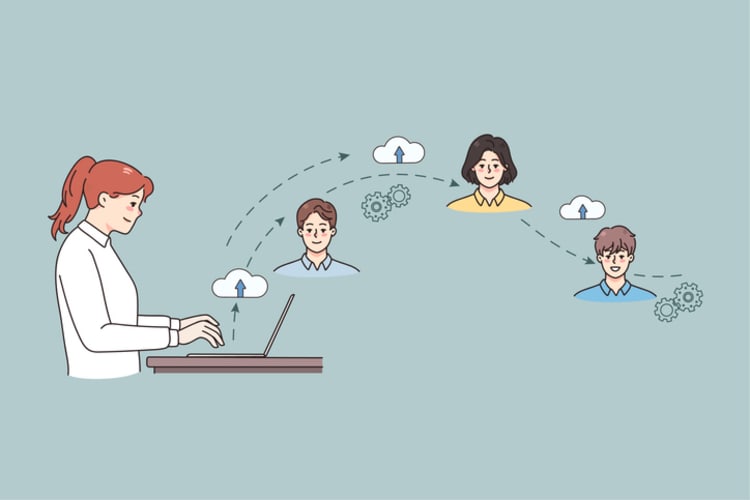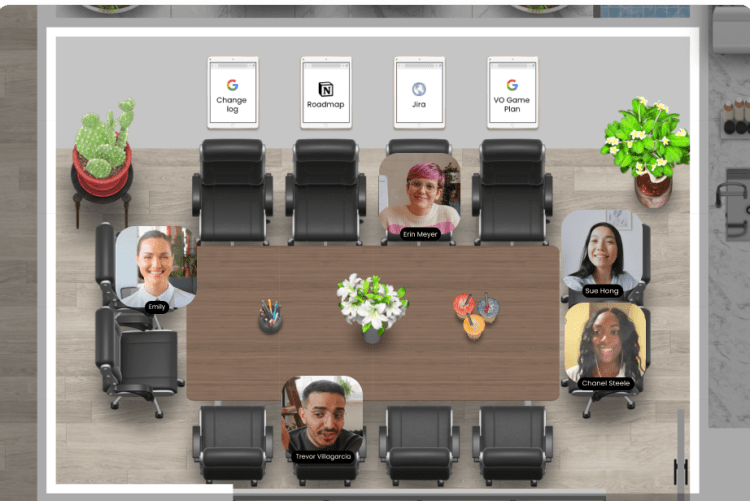As the world embraces the benefits of remote work, it’s time to unlock the potential of hiring remote workers and build a successful remote team. With Kumospace’s insights and guidance, we’ll provide you with a comprehensive guide on how to hire remote workers, navigating the remote hiring process from crafting an attractive job description to fostering a strong remote-first culture. Get ready to expand your team across different states and time zones, and experience the advantages of an inclusive, diverse, and productive remote workforce.
Key takeaways
- Hiring remote workers provides businesses with access to a global talent pool, increased diversity and cost savings.
- Identify job positions suited for a remote working environment, create an effective job description emphasizing communication & collaboration, and assess candidates’ skills & cultural fit.
- Build strong connection between team members by promoting diversity/inclusivity in the workplace and prioritizing employee well-being & work-life balance.
The advantages of hiring remote workers

The digital era has unlocked a global talent pool, permitting businesses to engage with proficient professionals globally. Employing remote workers offers several benefits:
- Access to a varied array of candidates
- Enhanced diversity within your organization
- Sparked creativity and innovation
- Enhanced profitability
Also, employing remote workers can result in cost savings for your company. With a reduced in-office workforce, overhead costs such as office space rental and utilities can be minimized. Remote employees can relish the benefits of working from home, including a flexible work schedule and the absence of a daily commute, which can enhance satisfaction and productivity levels.
Identifying the ideal remote job positions

When assembling a remote team for remote companies, it’s important to pinpoint the optimal remote jobs that can be carried out efficiently outside a conventional office setting. Positions in:
- Web development
- Sales
- Customer service
- Data analysis
Roles that can flourish in remote working environments are examples of positions that can successfully work remotely.
By discerning which roles are most fitting for remote work, you can make cognizant hiring decisions and establish a harmonious and productive remote workforce.
Crafting an attractive job description for remote roles

A well-crafted job description is the first step in attracting top remote talent. In this section, we’ll discuss how to craft an attractive job description for remote roles, focusing on essential elements, setting clear expectations for communication and collaboration, and showcasing your company’s culture and support for remote work.
Essential elements of a remote job description
To create a compelling remote job description, ensure it includes the following:
- Job title: Clear, concise, and descriptive, accurately reflecting the role and responsibilities of the position.
- Duties: Clearly outline the tasks and responsibilities associated with the job.
- Qualifications: Specify the required skills, experience, and education for the position.
- Benefits: Highlight any unique benefits or perks of the remote job.
- Application instructions: Provide clear instructions on how to apply for the position, including any required documents or forms.
A well-defined job description helps potential candidates understand the nature of the job and assess if their skills and experience align with the role.
In addition to the job title, outline the responsibilities, qualifications, and benefits associated with the role. Clearly defining the expectations of the job will not only help attract the right candidates, but also set a strong foundation for remote employees to understand their role and excel in their position.
Setting expectations for communication and collaboration
For remote roles, it’s vital to set clear expectations for communication and collaboration. In your job description, specify the preferred communication tools, expected response times, and any team collaboration practices. This helps remote hires understand how they’ll be expected to work with their team members and ensures they’re comfortable with the communication style.
Showcasing company culture and support for remote work
Your job description should additionally underscore your company’s culture and its backing for remote work. Accentuate remote work policies, accessible resources, and company values to demonstrate to potential candidates your organization’s dedication to crafting an inclusive and supportive remote work climate. This can help attract international employees, resulting in a more diverse workforce.
Besides, exhibiting your company’s culture can assist potential remote employees in assessing their compatibility with the company’s values and work conditions. By stressing company culture in your job description, you can attract candidates who value a positive working environment, consequently enhancing employee engagement and retention.
Sourcing top remote talent

Sourcing outstanding remote talent can pose challenges, but with appropriate strategies, you can attract exceptional candidates for your remote positions. Advertising your remote job on niche remote job sites like FlexJobs or Remote.co can help you reach a wider audience of qualified remote job seekers. By choosing to hire remote employees through these niche sites, you ensure your job ad reaches the right people and makes hiring remotely easier.
Leveraging your personal and professional networks can also be an effective way to source remote talent. Reach out to former colleagues, industry connections, and even friends or family members for referrals or recommendations. Platforms like Upwork can also connect you with freelancers and remote professionals who may be a great fit for your organization. By utilizing a variety of sources, you increase your chances of finding top remote talent for your team.
Assessing remote skills and experience

After identifying prospective candidates, it’s important to evaluate their remote skills and experience to decide if they’re a suitable fit for your remote team. We will cover the key skills to seek in remote workers, how to evaluate transferable skills and relevant experience, and the significance of cultural fit.
Key remote worker skills to look for
When assessing remote candidates, it’s crucial to involve remote workers checking for key remote worker skills such as:
- Time management
- Self-motivation
- Adaptability
- Strong communication
Self-motivated individuals are more likely to take initiative, set objectives, and maintain a high level of productivity, even without external motivation or oversight. Adaptability is another essential skill that allows remote workers to effectively manage the unique challenges and changes that come with working remotely.
Strong communication skills are paramount in a remote work environment. Candidates should demonstrate the ability to communicate effectively through various mediums, such as written communication, video calls, and team collaboration tools. By focusing on these key remote worker skills, you can ensure that your remote hires are well-equipped to excel in their roles and contribute to the success of your remote team.
Evaluating transferable skills and relevant experience
Besides key remote worker skills, it’s important to assess candidates’ transferable skills and relevant experience. Assess their past remote work experience and their ability to apply their skills in a remote setting. Consider candidates with prior remote work experience or those who have demonstrated self-motivation and discipline in their previous roles.
Also, evaluate the candidate’s transferable skills, such as communication, problem-solving, and collaboration, which can be applied across different industries and job functions. Remote workers must be able to communicate and collaborate with colleagues, manage their time productively, and solve issues autonomously. By assessing transferable skills and relevant experience, you can identify candidates who are well-suited for remote work and will thrive in your remote team.
Understanding the importance of cultural fit
Cultural fit is an important factor to consider when hiring remote employees. Assessing a candidate’s alignment with your company’s values and their ability to thrive in a remote work environment is essential. Cultural fit can impact employee engagement, productivity, and retention, making it a crucial aspect of the remote hiring process.
To evaluate a candidate’s cultural fit, consider their communication style, work ethic, and problem-solving skills. Ask behavioral interview questions that directly address remote work scenarios to assess their flexibility and adaptability in a remote setting. By understanding the importance of cultural fit, you can make informed hiring decisions and build a strong, cohesive remote team.
Conducting effective remote interviews

Interviewing remote candidates requires a different approach than traditional in-person interviews. In this section, we’ll discuss how to prepare for the remote interview process, utilize various interview formats, and ask remote-specific interview questions.
Preparing for the interview process
Before conducting remote interviews, it’s important to set clear expectations and involve relevant team members in the process. Use video interview tools like Kumospace to ensure a smooth and engaging interview experience for both the hiring manager and the candidate. By preparing for the interview process, you can effectively evaluate remote candidates and make informed hiring decisions.
Utilizing various interview formats
To effectively evaluate remote candidates, consider utilizing various interview formats, such as written assessments, video calls, and group interviews. Different interview formats can help you assess candidates’ skills, comfort with technology, and their ability to thrive in a remote work environment.
For example, different interview formats can help you assess different aspects of a candidate’s suitability for remote roles. Some examples include:
- Written assessments: These can help evaluate a candidate’s communication and problem-solving skills.
- Video calls: These can give you insights into a candidate’s ability to interact with team members and clients in a virtual setting.
- Group interviews: These can help assess how well a candidate collaborates with others and fits within your team’s dynamics.
By using various interview formats, you can more accurately assess a candidate’s suitability for remote roles.
Remote-specific interview questions
Asking remote-specific interview questions can help you assess a candidate’s remote work experience, time management skills, and their ability to handle distractions. Examples of remote-specific interview questions include:
- Can you describe your remote work environment?
- How do you manage your time and tasks while working remotely?
- How do you address or prevent distractions while working remotely?
By asking remote-specific interview questions, you can gain insights into the candidate’s experience working remotely and their ability to succeed in a remote work environment. This information can help you make informed decisions when hiring remote employees and ensure that your remote hires are well-equipped to excel in their roles.
Onboarding and integrating remote employees

Once you’ve hired remote employees, it’s essential to onboard and integrate them effectively into your remote team. In this section, we’ll discuss providing necessary tools and resources, fostering connection and teamwork, and establishing clear expectations and goals.
Providing necessary tools and resources with Kumospace

To set your remote employees up for success, it’s crucial to provide them with the necessary tools and resources. Virtual office tools like Kumospace can facilitate collaboration and productivity in remote teams. Kumospace stands out by offering an immersive experience that simulates a real-life office environment. It allows users to create customizable virtual spaces, such as meeting rooms, lounges, or personal desks. This setup not only encourages spontaneous interactions, akin to those in physical offices but also supports structured meetings and collaborative sessions.
With features such as spatial audio, which mimics the way sound travels in the real world, employees can engage in private conversations or join larger group discussions, just by moving their avatars around the space. Additionally, Kumospace integrates various productivity tools and applications, ensuring that teams can access everything they need within the virtual environment. These integrations allow for seamless transition between collaborative work and individual tasks, enhancing overall efficiency.
Furthermore, Kumospace's unique approach to remote working can significantly boost team morale and reduce the feeling of isolation often experienced in traditional remote setups. By providing a more engaging and interactive platform, employees can feel more connected to their colleagues and company culture.
Fostering connection and teamwork

Building a strong remote team requires fostering connection and teamwork among your remote employees. Here are some strategies to achieve this:
- Organize virtual team-building activities.
- Encourage regular communication through video calls, chat platforms, and email.
- Assign a buddy or mentor to help new remote hires feel connected and supported within the team.
By implementing these strategies, you can create a sense of camaraderie and collaboration among your remote team members.
Promoting consistent communication among remote team members is also essential for fostering connection and teamwork. Utilize communication tools such as Slack or Zoom, and hold regular team meetings to ensure that all team members are informed and engaged. By fostering connection and teamwork, you can create a strong, cohesive remote team that thrives on collaboration and support.
Establishing clear expectations and goals

Setting clear expectations and goals for remote employees is crucial for ensuring their success and productivity. Establish performance benchmarks, define project timelines, and conduct regular check-ins to monitor progress and provide feedback. By setting clear expectations and goals, remote employees can better understand their role and work towards achieving their objectives.
Goal setting is also essential for remote employees’ well-being and work-life balance. Here are some tips to encourage goal setting and maintain a healthy balance:
- Encourage remote workers to set personal and professional goals.
- Provide support and resources to help them achieve their goals.
- Emphasize the importance of work-life balance and encourage employees to prioritize self-care.
- Foster a culture of open communication and flexibility to accommodate personal needs. By prioritizing employee well-being and work-life balance, you can create a remote team that is productive, engaged, and motivated.
Navigating legal and payroll considerations

Hiring remote employees across different states or countries can present legal and payroll challenges. It’s important to understand international employment laws, manage payroll complexities, and ensure compliance with tax regulations when hiring remote employees. Failing to do so can result in fines, penalties, and legal disputes.
To adeptly handle international payroll complexities, you might consider delegating payroll management to an employer of record like Remote. This strategy can aid in navigating local laws, managing payroll funding regulations, and ensuring compliance with labor requirements, enabling you to concentrate on building and managing your remote team.
Building a strong remote-first culture

Establishing a successful remote team entails more than merely hiring the right individuals. We will cover how to foster a robust remote-first culture through promoting diversity and inclusivity, encouraging open communication channels, and prioritizing employee well-being and work-life balance.
Promoting diversity and inclusivity

A diverse and inclusive remote team is essential for fostering creativity and innovation. Actively seek to hire from a wide range of backgrounds and experiences to create a diverse talent pool and ensure an inclusive work environment for all remote employees.
Promoting diversity and inclusivity not only benefits your remote team but also adds to the overall success of your organization.
Encouraging open communication channels
Maintaining open communication channels is vital to a successful remote team. Here are some strategies to consider:
- Employ various communication tools, such as Slack or Zoom, to facilitate real-time communication and collaboration.
- Conduct regular team meetings to assure that all team members are informed and connected.
- Create opportunities for feedback and encourage team members to share their ideas and concerns openly.
By implementing these strategies, you can foster effective communication within your remote team.
By establishing open communication channels, you create a strong remote-first culture that fosters collaboration, trust, and connection among your remote employees. This, in turn, leads to higher productivity and a more effective remote team.
Prioritizing employee well-being and work-life balance

Employee well-being and work-life balance are vital elements of a robust remote-first culture. Provide flexible work hours, advocate for mental health resources, and encourage employees to take breaks and time off to recharge. These practices not only support employee well-being but also enhance overall productivity and engagement.
Furthermore, prioritize mental health by providing resources and fostering open communication about mental health within your remote team. By prioritizing employee well-being and work-life balance, you create a remote team that feels supported, connected, and motivated to succeed.
Summary
In conclusion, building a successful remote team involves a comprehensive approach, from crafting an attractive job description to fostering a strong remote-first culture. By following the insights and guidance provided in this guide, you can effectively navigate the remote hiring process, build a diverse and inclusive remote team, and cultivate a thriving remote work environment. Embrace the potential of remote work and experience the benefits of an engaged and productive remote workforce.
Frequently asked questions
To hire a remote employee, create a job description and review resumes, then arrange a video call interview to assess their capabilities. Check references and set expectations around communication and management before creating a contract.
Remote employees cost an average of $423 per month, saving employers $440 per month and $5,280 annually.
Remote work provides companies with a range of cost savings benefits, such as reduced overhead costs, decreased relocation costs and lower building rental and office supplies expenses. As a result, having remote workers is generally cheaper for companies than having on-site employees.
Slack, Zoom, Microsoft Teams and Google Hangouts are all great tools for remote teams to effectively communicate. These platforms offer a range of features to facilitate communication regardless of location.
Evaluate the remote candidate's cultural fit by assessing their communication style, work ethic, problem-solving skills, and asking behavioral interview questions tailored to a remote work environment.





